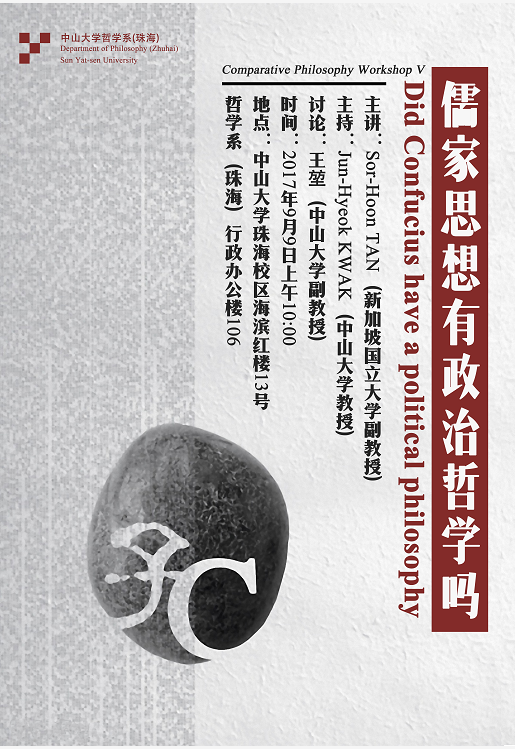Comparative Philosophy Workshop (V): Did Confucius have a political philosophy?
儒家思想有政治哲学吗?

Comparative Philosophy Workshop (V)
Organizer: Department of Philosophy (Zhuhai),Sun Yat-sen University
Topic: Did Confucius have a political philosophy?
Speaker: Sor-Hoon TAN (Associate Professor, National University of Singapore)
Moderator: Jun-Hyeok KWAK (Professor, Sun Yat-sen University)
Discussant: Kun Wang (Associate Professor, Sun Yat-sen University)
Time: Sept. 9th, 10:00am
Venue: R106, No.13 Administrative Building of Department of Philosophy (Zhuhai), SYSU
Mou Zongsan (1909-1995), famously distinguished pre-modern Confucian concern with government as “administrative” (zhidao– answering the question of how best to bring about social order – contrasted with the “political” (zhengdao) concern answering the question of “Who rules” and what legitimates a particular political regime. Recently, there has been growing discussions of Confucian political philosophy, which in some cases assume that Confucians, beginning with Confucius, have a political philosophy to offer. Some go so far as to identify concerns with procedural matters and norms of “order” that they argue are not subordinated to ethical ends. This implies a distinctive political domain or dimension that fit better with the modern assertion of the autonomy of the political. However, the asserted autonomy requires a specific conception of the political that arose only in the modern era, since the Enlightenment and its legacies in subsequent centuries. Chris Thornhill notes that arguments for the political as an autonomous, even sui generis, category explain the political by reference to assumed but contestable philosophical anthropologies – be it Carl Schmitt’s assumption of human predisposition for “competitive conflict” over power or Hannah Arendt’s account of authentic human life in terms of a specific capacity for freedom.
I shall explore to what extent the political in the Confucian canonical texts is autonomous, whether one might be distorting Confucianism (if not all ancient Chinese thought) by reading into its texts a historically and culturally specific category from an alien civilization of different times, and how one could justifiably “modernize” Confucianism by reconstructing its philosophy to accommodate the autonomously political.
Comparative Philosophy Workshop系列第五讲
主题:儒家思想有政治哲学吗?
主持:Jun-Hyeok KWAK(中山大学教授)
讨论:王堃(中山大学副教授)
时间:2017年9月9日上午10:00
地点:中山大学珠海校区海滨红楼13号哲学系(珠海)行政办公楼106
摘要:
牟宗三(1909-1995)曾将前现代儒家思想中政府“治道”(实现社会秩序的最佳方式) 与“政道”(解答了“谁统治“和如何使政治制度合法化)进行了著名的对比。最近,人们对儒家政治哲学的讨论日益增多,其中的一些观点认为儒家思想从孔子开始就具有政治哲学。另一些人走得如此之远,以至于认为那些程序事务以及“秩序”规范并不从属于伦理目的。这暗示了儒家思想中含有一个独特的政治领域或维度,而这更加符合现代关于政治自主性的论断。然而,所谓的自主性需要一个特定的、只有在现代才产生的政治概念,产生于启蒙运动以及随后几个世纪的思想遗产。克里斯·索恩希尔(Chris Thornhill)指出,认为政治拥有自主性甚至认为政治是自成一体的论据,是通过引用一种假设的但并非不可置疑的哲学人类学来解释政治的——无论是卡尔·施米特(Carl Schmitt)假设人类对权力具有“竞争冲突”的倾向,还是汉娜·阿伦特(Hannah Arendt)假设真正的人的生活建立在一种特定的自由能力之上。我将探讨儒家经典中的政治思想体现自主性的程度,并考察人们是否可能从不同时代外来文明的角度,以一个特定的历史和文化范畴来阐释儒家经典文本而导致歪曲误读儒家思想(如果不是全部的中国古代思想),以及人们如何可能通过重构儒家的哲学以来适应自主的政治,从而将儒家思想正当地“现代化”。


